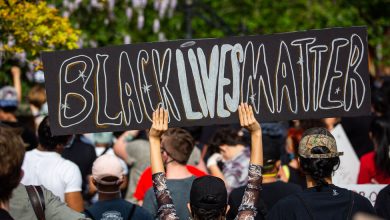Supreme Court Refuses for Now to Restore Biden Plan on Immigration Enforcement

WASHINGTON — The Supreme Court handed Texas and Louisiana a temporary victory on Thursday, allowing a federal judge to block immigration enforcement guidelines issued by the Biden administration that he said allowed the release of undocumented immigrants with criminal records.
In a brief order, the court gave no reasons, which is typical when the justices act on emergency applications, but it said it would take up an appeal of the case and hear arguments this year.
Four justices dissented: Justice Amy Coney Barrett and the three liberal members. That included Justice Ketanji Brown Jackson, who recorded her first vote since she was sworn in last month.
The guidelines, issued in September, set priorities for deciding which immigrants should be arrested and deported, focusing on “national security, public safety and border security.” But they also gave Immigration and Customs Enforcement agents substantial discretion to decide whether enforcement actions were warranted.
The guidelines were part of an effort to roll back the broad immigration arrest policies of the Trump administration. The ruling is not likely to drastically change how ICE operates, partly because the agency does not have the capacity to detain all migrants with criminal convictions. But it was yet another setback for the Biden administration on immigration, which has become a political liability as officials have struggled to contain surges of migrants at the border and have had to fight numerous court battles to try to replace the hard-line policies they inherited.
The Supreme Court’s Major Decisions This Term
A momentous term. The U.S. Supreme Court issued several major decisions during its latest term, including rulings on abortion, guns and religion. Here’s a look at some of the key cases:
Abortion rights. In Dobbs v. Jackson Women’s Health Organization, the court ruled that a Mississippi law that bans most abortions after 15 weeks is constitutional and overturned the constitutional right to abortion established by Roe v. Wade in 1973.
Second Amendment. In New York State Rifle & Pistol Association v. Bruen, the court struck down a New York law that placed strict limits on guns outside the home, ruling that states with strict limits on carrying guns in public violate the Second Amendment.
Climate change. In West Virginia v. Environmental Protection Agency, the court ruled against the E.P.A., limiting its ability to regulate carbon emissions from power plants and making it much tougher for President Biden to achieve his climate goals.
School prayer. In Kennedy v. Bremerton School District, the court ruled that a Washington football coach at a public high school had a constitutional right to pray at the 50-yard line after his team’s games.
Separation of church and state. In Carson v. Makin, the court ruled that a Maine program that excludes religious schools from a state tuition program is a violation of the free exercise of religion.
Immigration. In Biden v. Texas, the court ruled that the Biden administration may rescind the Trump-era “Remain in Mexico” program, which forces certain asylum seekers arriving at the southwestern border to await approval in Mexico.
Biden administration officials have said it is necessary for ICE to set priorities in light of the fact that there are more than 11 million noncitizens in the United States and that the federal government does not have the resources to apprehend and seek to deport all of them.
Texas and Louisiana filed suit to block the guidelines, which they said allowed many immigrants with criminal records to remain free while their cases move forward, imposing burdens on the states’ justice systems.
Judge Drew B. Tipton of the Federal District Court in Victoria, Texas, agreed, issuing a ruling that blocked the use of the guidelines throughout the nation. A unanimous three-judge panel of the U.S. Court of Appeals for the Fifth Circuit, in New Orleans, refused to stay the ruling.
The panel, in an unsigned opinion, said the Department of Homeland Security had put improper weight on policy considerations in a memorandum describing the administration’s approach.
“For example,” the panel wrote, “it provides that the guidelines ‘are essential to advancing this administration’s stated commitment to advancing equity for all, including people of color and others who have been historically underserved, marginalized and adversely affected by persistent poverty and inequality.’”
“D.H.S.’s replacement of Congress’s statutory mandates with concerns of equity and race is extralegal, considering that such policy concerns are plainly outside the bounds of the power conferred by” the immigration laws, the panel wrote.
In a separate but nearly identical case brought by three other states — Arizona, Montana and Ohio — a unanimous three-judge panel of the Sixth Circuit, in Cincinnati, came to the opposite conclusion.
Chief Judge Jeffrey S. Sutton, writing for the panel, said the guidelines were in keeping with the approaches of previous administrations. “Federal law gives the national government considerable authority over immigration policy,” he wrote.
In a request for emergency relief from the Supreme Court in the case brought by Texas and Louisiana, Solicitor General Elizabeth B. Prelogar wrote that Judge Tipton’s ruling was “disrupting D.H.S.’s efforts to focus its limited resources on the noncitizens who pose the gravest threat to national security, public safety and the integrity of our nation’s borders.”
Ms. Prelogar also suggested that the court treat the application for a stay as a petition to take up the case before any final judgment in the lower courts. The unsigned order said the court would do so, setting arguments for “the first week of the December 2022 argument session.”
Ms. Prelogar had also suggested that the court could use the case to curb what it called “a troubling trend” of states suing the federal government.
“For most of our nation’s history, a suit like this would have been unheard-of,” Ms. Prelogar wrote, adding, “Courts did not allow states to sue the federal government based on the indirect, downstream effects of federal policies.”
More recently, she wrote, such suits have become common. California filed 122 lawsuits against the Trump administration, or about one every two weeks, she wrote, while Texas has sued the Biden administration 27 times, with 11 of the suits concerning immigration.
Ms. Prelogar also questioned the nationwide scope of Judge Tipton’s ruling, saying it gave the three states in the other case “the very relief they were denied by the Sixth Circuit in their own suit.”
In response, lawyers for Texas and Louisiana wrote that the states had suffered direct and concrete injuries that entitled them to sue, adding that federal law required the administration to detain immigrants that its guidelines allowed to be released.
Charlie Savage and Eileen Sullivan contributed reporting.





